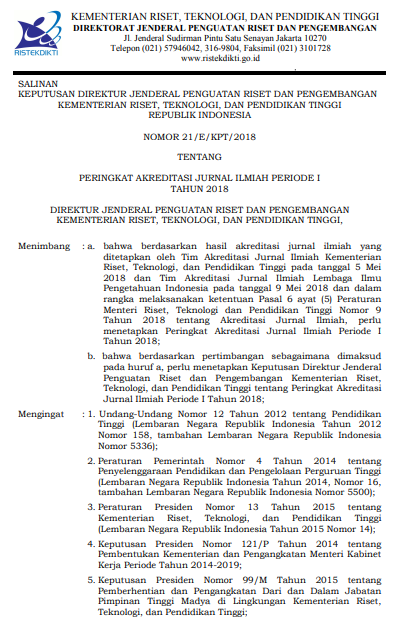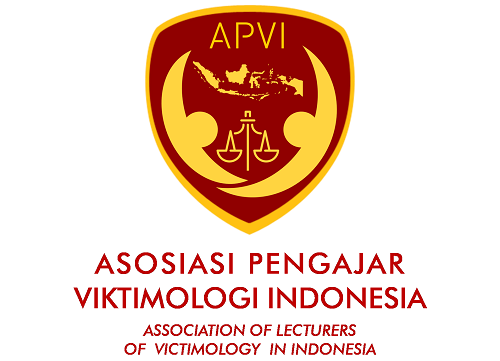RESTORATIVE JUSTICE CONCEPT ON JARIMAH QISHAS IN ISLAMIC CRIMINAL LAW
Abstract
Essentially, Islamic law is modern law since it has recognized restorative justice for jarimah qishas (murder or torture). The concepts of restorative justice in Islamic criminal law realize fairness and balance to the offender and the victim themselves. Restorative justice in Islamic criminal law as explicitly provided in Q.S. al-Hujurat (49): 10 and Q.S. Asy-Syuura (42): 40. The Quran regulates peace and forgiveness in solving a crime. The existence of peace and forgiveness aims to realize the unity and sustainability of life as a purpose of the laws. Peace and forgiveness are premium remedium while the penalty is ultimun remediun in Islamic criminal law. Otherwise, in modern criminal law, the penalty is premium remedium.
Keywords: Forgiveness, Peace, Qishas, Restorative Justice
Full Text:
PDF View
References
Ali, Mahrus dan Syarif Nurhidayat. 2011. Penyelesaian Pelanggaran HAM Berat In Court System & Out Court System. Jakarta: Gratama Publishing;
Candra, Septa. “Politik Hukum Pengadopsian Restorative Justice Dalam Pembaharuan Hukum Pidana”. Fiat Justisia Jurnal Ilmu Hukum, Vol. 8 No. 2. April-June 2014. Page. 255-277;
____ “Restorative Justice: Suatu Tinjauan Terhadap Pembaharuan Hukum Pidana Di Indonesia”. Jurnal RechtsVinding. Vol. 2 No. 2. August 2013. Page. 263-277;
Fitriani, Ifa Latifa. “Islam dan Keadilan Restroratif Pada Anak yang Berhadapan Dengan Hukum”. In Right: Jurnal Agama dan Hak Azazi Manusia. Vol. 2 No.1. 2012. Page. 207-238;
Gabbay, Zvi D. “Justifying Restorative Justice: A Theoretical Justification for the Use of Restorative Justice Practices”. Journal of Dispute Resolution, Vol. 2005 Issue 2. 2005. Page. 263-277;
Haqqi, Abdurrahman Raden Aji. “Criminal Punishment and Pursuit Justice In Islamic Law”. International Journal of Technical Research and Applications. Special Issue 15. January-February 2015. Page. 1-10;
Hascall, Susan C. “Restorative Justice in Islam: Should Qisas Be Considered a Form of Restorative Justice?”. Berkeley Journal of Middle Eastern & Islamic Law, Vol. 4 Article 2. 2012. Page. 35-78;
Heidari, Mohammad Ali and Masoma Porshabanan. “Study of Restorative Justice and Distributive Justice from the Perspective of Islamic Law and Jurisprudence”. New York Science Journal. Vol. 8. No. 6. 2015. Page. 80-85.
Maghaireh, Alaeldin. “Shariah Law And Cyber-Sectarian Conflict: How Can Islamic Criminal Law Respond To Cyber Crime?” International Journal of Cyber Criminology. Vol. 2 Issue 2. July-December 2008. Page. 337-345.
Maghfirah, Aliflanya Arisandy. et.al. “Sulh’ In Islamic Criminal Law as The Form of Restorative Justice: A New Framework in Indonesian Criminal Law”. Proceedings. Proceeding of Scientific Cooperations 2nd International Conference on Social Sciences of Istambul Turkey . 2nd-3rd of April 2016;.
Muhammad, Ramizah wan. “Restorative Justice in Islamic Criminal Legal System”. Journal of Islamic Law Review. Vol. 12 No. 2. December 2016. Page. 191-213;
Okon, Etim E. ”Hudud Punishments In Islamic Criminal Law”. European Scientific Journal. Vol. 10 No. 14. May 2014. Pp.227-238;
Prayitno, Kuat Puji. “Restorative Justice untuk Peradilan di Indonesia (Perspektif Yuridis Filosofis dalam Penegakan Hukum In Concreto)”. Jurnal Dinamika Hukum. Vol. 12 No. 3. September 2012. Page. 407-420;
Qafisheh, Mutaz M. “Restorative Justice in the Islamic Penal Law: A Contribution to the Global System”. International Journal of Criminal Justice Sciences. Vol. 7 Issue 1. January–June 2012. Pp. 487-507;
Rahman, Budi Munawar. 2012. Ensiklopedia Nurcholis Madjid. Jilid Dua. Jakarta: Yayasan Abad Demokrasi;
Rahmatiah HL, “Remisi Dalam Tindak Pidana Pembunuhan (Studi Perbandingan Hukum Pidana Islam dan Hukum Pidana Nasional) Jurnal Al-Qadāu, Vol. 1 No. 1. 2014. Pp. 1-17;
Rajafi, Ahmad. “Qishash dan Maqashid Al-Syariah (Analisis Pemikiran asy-Syathibi dalam Kitab Al-Muwafaqat). Jurnal Al-Syir’ah. Vol. 8 No. 2. December 2010. Page. 459-478;
Sodikin, Ali. “Restorative Justice dalam Tindak Pidana Pembunuhan: Perspektif Hukum Pidana Indonesia dan Hukum Pidana Islam”. Asy-Syir’ah: Jurnal Ilmu Syari’ah dan Hukum, Vol. 49 No. 1. June 2015. Page. 63-100;
Surya, Faizal Adi. “Tinjaun Mediasi Penal Dalam perspektif Hukum Adat dan Hukum Islam” Jurisprudence, Vol. 5 No. 2. September 2015. Page. 118-126;
Waluyadi,” Islam Menurut Hukum Islam Relevansinya dengan Hukum Pidana di Tingkat Penyidikan”, Yustitia, Edisi 89. Mei-Agustus 2014. Page. 29-42;
Yusuf, Hambali. & Saifullah Basri, “Model Penyelesaian Alternatif Perkara Pidana Pembunuhan Biasa menurut Hukum Islam dan Relevansinya dengan Pembaharuan Hukum Pidana Indonesia”, Jurnal Hukum IUS QUIA IUSTUM, No. 1 Vol. 24. Januari 2017. Page. 73-93;
Zainuddin. 2013. Hukum Zakat: Perspektif Normatif, Kesejahteraan dan Keradilan Sosial. Makassar: Alauddin University Press;
Zulfa, Eva Achjani. “Restorative Justice in Indonesia: Traditional Value”. Indonesia Law Review. Vol. 2 No. 1. May-August 2011. Page. 33-43.
DOI: http://dx.doi.org/10.20884/1.jdh.2017.17.3.826
Refbacks
JURNAL DINAMIKA HUKUM Indexed by :
 | Jurnal Dinamika Hukum | |
| Faculty of Law, Universitas Jenderal Soedirman | Copyright of Jurnal Dinamika Hukum | |
| Yustisia IV Building, Law Journal Center | ISSN 2407-6562 (Online) ISSN 1410-0797 (Print) | |
| Purwokerto, Central Java, Indonesia, 53122 | JDH is licensed under a Creative Commons Attribution 4.0 International License | |






